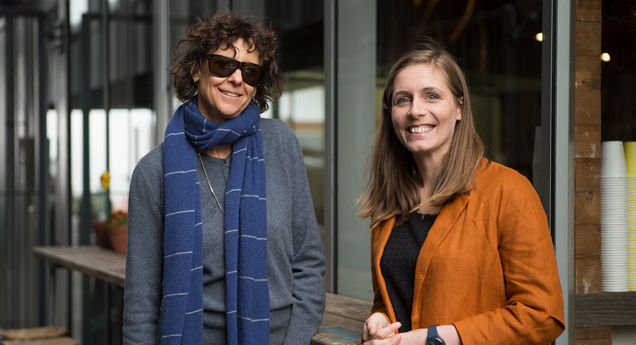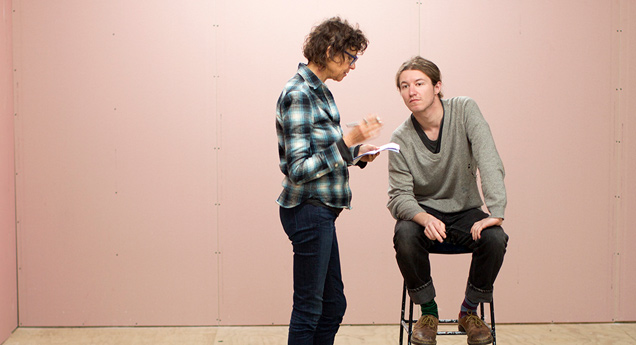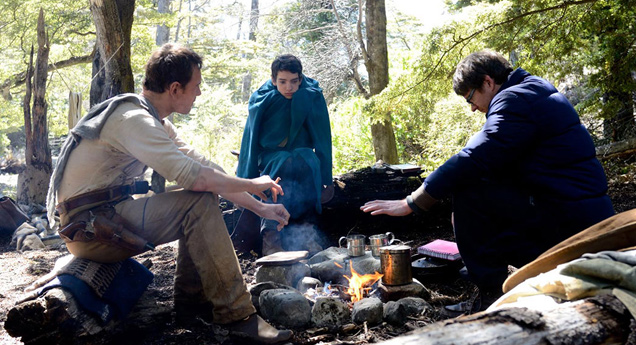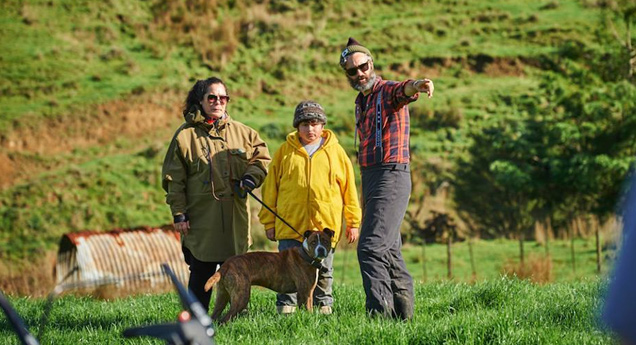Moa-nominated ‘Wilderpeople’, ‘Slow West’, and ‘The Rehearsal’ Writers on Their Screenplays

The NZ Film Awards are almost upon us (Saturday Feb 18th, to be precise) – and we still have to get to the bloody drycleaners. As proud sponsors of Best Screenplay we’re more concerned with finding out who is taking home the Moa this year than worrying about a crease or two though. OK, and we’re sort of interested in the other award winners, too…
Back to Best Screenplay, however. We posed some curly questions to nominees in this category, and here’s what Alison Maclean & Emily Perkins (The Rehearsal), John Maclean (Slow West) and Taika Waititi (Hunt for the Wilderpeople) had to say about writing their films.
When did you first put pen to paper, or finger to key, on your screenplay?
ALISON MACLEAN: Emily and I started talking about it in 2012, on Skype and in person, and she embarked on the first draft around February, 2013.
JOHN MACLEAN: Around 2012 I started writing Slow West and it took me a ‘year and a bit’ to write.
TAIKA WAITITI: 2004, I think.
How long was the journey to completion, and how surprised were you by where it took you along the way?
J. MACLEAN: As it was my first screenplay, I was learning as I went along, mostly thanks to a great script editor called Kate Leys, who was my guide/mentor/therapist. The surprises came as eureka moments, as the process was different to what I had read in ‘how to’ books – much closer to tapping the subconscious and daydreaming than any structural rules.
EMILY PERKINS: The script went through several drafts over about three or four years, and rewrites continued through the shooting process. Some of the biggest surprises came in the form of character development – whether it’s more interesting when a character is male or female, say. From the start, the vision was not to slavishly enact the book but to render the essence of the book in a cinematic experience that would be its own thing. That meant we were quite open to changes and new ideas.
WAITITI: I wrote a bunch of drafts over three years but then left the project to make my first feature. I returned to the material in 2014.
How do you feel about the stereotype of writing being a lonely, procrastinating, business – and if you agree with that sentiment, how do you push through the tough stages of the process?
J. MACLEAN: It’s all true, it is lonely and procrastinating business. You need to get to the tough stages, that’s when you know you are doing the hard work, and it’s not obvious. The tough stages will get you one sentence – one deep defining sentence about what your character wants or what the film is really about. When you push through this stage, it becomes much easier to write page after page and dialogue flows, scenes have purpose. The other tough stage is throughout the process and its self confidence, again you have to embrace the doubt and keep a hold of your instincts.
WAITITI: It’s true. But I don’t mind being alone so it suits me just fine. The hard part is if you’re stuck for ideas or if you have story obstacles to overcome. You can spend a lot of time staring into space.
E. PERKINS: I’d argue that it doesn’t feel lonely – when you write you’re inhabiting and creating a world full of shifting, developing characters, and it feels quite lively, in your own mind! And then co-writing is the opposite of a solo activity, though we both spent long periods working on the script alone before coming together again to compare scenes and draft ideas. Collaboration helps with procrastination too – you’ve got to get that scene ready for your writing partner to see – and all deadlines are great. Keeping the faith is challenging for any writing project, but it helps to have more than one person carrying their belief in it.

Is there a specific scene in the film that was a bit of a breakthrough in what you were trying to achieve?
E. PERKINS: We knew the scene where Stanley ‘turns into’ his father would have to be a breakthrough moment for him. It’s there in the book but we wanted to embed the action in our Stanley, our Hannah – it seemed to be a scene that worked early on, and became a kind of fulcrum in the script. And then the performances took it further again.
J. MACLEAN: There were many mini breakthroughs rather than an eureka moment. I gave my random notes and thoughts to my script editor then we went through them together looking for connections. So when I realised the character of Jay was hopeless yet full of life and willing to die for love, and the character of Silas was well equipped yet lonely and dead in side, then it was just a matter of them ‘teaching’ each other.
WAITITI: I enjoyed developing Paula and Andy’s scenes once I had found their dynamic. I remember being happy when I decided she needed a kind of bumbling side-kick.
On the other hand, is there one that was just a real bastard to get right?
J. MACLEAN: The ‘bastard’ was the edit, and really the beginning of Act One in the edit. It worked in the script, to introduce the character in the middle of the Colorado forest and use flashbacks to explain, but when it came to editing, we couldn’t find the best place to ‘drop into’ the story and where to use the flashbacks. The flashbacks were quite long in the script and they were well written so they read well, but in the finished film, they dragged you out of the hero’s journey and became more distracting. So I really had to cut them right down. Kill your darlings – always said, hard to do.
WAITITI: The hardest scene to get right was probably the one where Ricky sees the cops approaching in the bushes towards the end of the film. It was hard to figure out how that scene would unfold or how to make it feel exciting and desperate but also fun. A lot of that tone came about once we found the location and our cast.
A. MACLEAN: The ending was always our biggest challenge. We had the image of curtains opening in a theatre: that’s all we took from the book… The problem the characters face in coming up with a new idea at the last minute for their end of year show, was our problem, too, as writers.

Any screenplay is likely to be anchored by some human commonalities, but were there things that took place in the wider world during the writing process – or after it – that mirrored any particular elements of your writing?
E. PERKINS: In terms of commonalities, we’d been to art school and drama school, we’d known charismatic, dangerous teachers, and we researched those worlds so that we could write beyond our own experience as well. Then the rehearsal process and the shoot almost mirrored a mini drama school, with all the intensity and bonding and wildness and silly fun that the young actors bring.
J. MACLEAN: I had always been interested in where people are from. America’s a land of Immigrants, but in Westerns they were always ‘American’ so I wanted to say something about this – make a Western full of immigrants and Native Americans – which is very apt now.
WAITITI: A couple of incidents happened in New Zealand – mainly to do with the foster care system – which were in the back of my mind when I was writing, however I didn’t want to make the film a commentary on those issues. It was just something that helped me understand that there are real Ricky Bakers out there.
To what extent is the writing process influenced by how you saw the shoot taking place – having a specific director (yourself in some cases), cast member, location in mind while writing?
A. MACLEAN: As a writer/director, I imagine scenes playing out in my head but I know so much will change. We didn’t write with specific actors or locations in mind; that came later. My instinct is probably to describe less in a screenplay I’ll be directing myself than I would if it was somebody else.
J. MACLEAN: It was great to have Michael Fassbender on board before writing; I really could make the character ‘Silas’ drawn out of knowing Michael’s physique. The location I had in mind was Southern Colorado, but when I recce’d in NZ, I was amazed that there were locations I had imagined – a crack in a rock that the characters ride through, that I wouldn’t have found in Colorado. I didn’t have to change any of the script to film in New Zealand; we just had to be creative in-camera with a silver birch forest and a wheat field that didn’t exist.
WAITITI: We didn’t find our locations or cast until very close to the shoot, so I had to kind of guess a lot of it. I knew tonally what I wanted the film to be but the look and feel took some development.

When you look at other films, how does good screenwriting come across to you?
WAITITI: It’s effortless and you often don’t notice it. That’s how I feel I recognise the best writing, when I haven’t noticed it and I’m carried away by the story.
A. MACLEAN: A good screenplay is vivid yet leaves something to the imagination; it’s propulsive – it keeps me turning the pages. I love specificity and I love to be surprised. Stereotypes and overly familiar storylines are a big turn off.
J. MACLEAN: It is the most important thing – script is everything. Once you have that foundation, it is so much easier to hide the script, through acting and camera, but whether it is Die Hard, Toy Story, ET, or Stalker, you need the writing and it needs to be great.
What do you think the other Best Screenplay nominees have in common with your film?
J. MACLEAN: Unfortunately, I’ve only seen Hunt for the Wilderpeople so I cant really comment. I think Wilderpeople, which I loved, like Slow West has various tones working together – comedy and tragedy, down-beat emotion and social commentary butting up against slap-stick – which I love!
WAITITI: We’re human.
What do you think are the pros and cons of having overseas judges decide the winner, and how do you think that may impact your odds? (Don’t worry, it’s probably too late to offend anyone enough to trip yourself up)
WAITITI: I think it’s fine. They might not get some of the nuances of New Zealand humour or language but films scripts should probably be relatable to everyone if they’re going to make a decent film.
J. MACLEAN: I’m just happy to be in the mix!
Check out DVD and On Demand options for ‘The Rehearsal’
Check out Blu-ray, DVD and On Demand options for ‘Slow West’
Check out Blu-ray, DVD and On Demand options for ‘Hunt for the Wilderpeople’


















